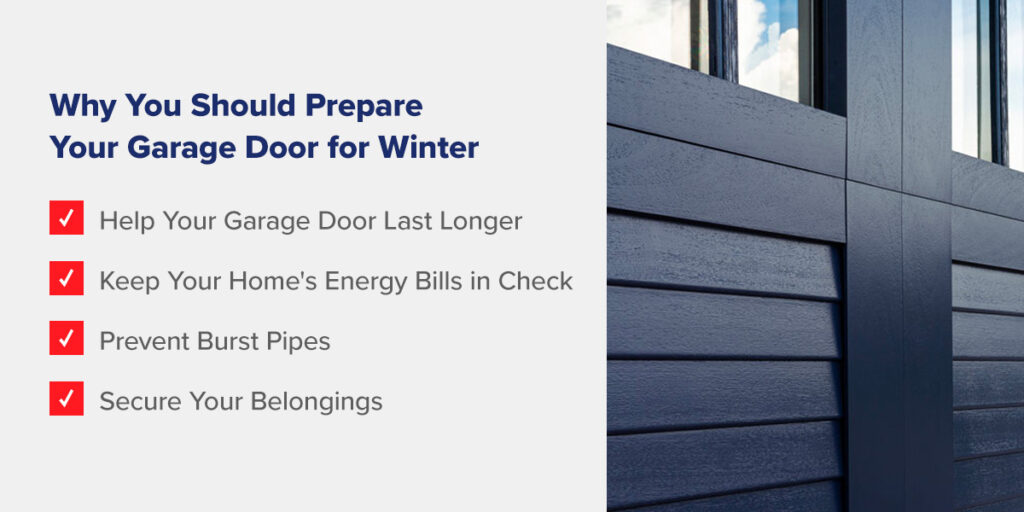Come and See Us At The 2025 Portland House & Outdoor Living Show!

April 4th – 6th at the Oregon Convention Center
A good garage door should last you year after year, even through the change of seasons and multiple daily cycles (opening and closing). But there are threats to your garage door in winter that you may need to address.
Getting your garage door stuck is always bad, but when your garage door is stuck in winter, it can create all sorts of problems. Leaving a garage door open in winter allows warm air to escape your home, driving up energy costs and allowing anything in your garage, like your car, to be fully subjected to the elements.
To help you with your garage door winter maintenance, here’s what you need to know about why you should winterize your garage door and how to prepare a garage door for the winter.
Why is winter such a problem for garage doors? There are several reasons. For one, cold weather can simply put stress on a garage door. Your garage door is made of a lot of moving parts that must work in tandem to lift a door that may weigh hundreds of pounds. If the lubrication dries out or the door becomes denser due to the cold, that’s more work for springs, rollers and other components.
Heat transfer is also a problem. If your door is not properly insulated, warm air can escape your home through the garage door. This means it is much harder to heat your home, and the energy costs can really add up during the winter.
Then there’s snow. Not only can snow collect on a door and make it harder to open, but snow means moisture, which can get into the various parts of your garage door mechanism, freeze and cause them to stick. Moisture can even damage the sensitive electronics in your keypad or garage door opener.

Winter brings cold, wet weather with it. Preparing your garage door before winter gets underway helps keep that cold, wet air out of your home. Think of winterizing your garage door as part of your routine maintenance tasks. A bit of effort today will pay off in the long run.
You use your garage door daily, often multiple times a day. The more attention you give it, the longer it will last, which can help you save money in the long run. Instead of rushing out to buy and install a new garage door, you can enjoy the one you have had for years, then decide to replace it when the time is right.
If your garage is attached to your home, ensure the door is ready for winter. A bit of winter prep can keep the cold air from entering your garage and seeping into your home. Your heating system won’t need to work so hard, so your energy bills won’t skyrocket. When your garage stays relatively warm, the warmth can transfer into your home through the shared wall.
Your home may have piping that runs through the garage. If the door can’t close and the garage becomes very cold, the water in those pipes can freeze, causing the pipes to break or burst. You may end up with a mess on your hands and a hefty plumbing bill. Winterizing the garage can prevent the pipes from freezing.
The garage is often an extra storage space full of your possessions. Winterizing the door makes you feel confident that your belongings are stashed away safe and sound, under lock and key.
You can see how important it is to maintain and protect your garage door in the winter. Here are some garage door cold-weather maintenance tips to consider. Ideally, you should take these steps at the end of fall, just as winter is approaching, but if you haven’t done these things yet, you should go ahead and do them even if winter has already arrived.
If you are trying to prevent snow, moisture and cold from getting into your garage, quality, intact weather stripping is critical. Even a small crack or gap in your weather stripping can render it basically useless. Take the time to examine the frame and bottom of your garage door and make sure the weather stripping is completely intact. If there are any cracks, gaps or loose pieces, call for repair immediately.
Get some approved garage door oil and lubricate the springs, rollers, tracks and any other moving parts that require it. New lubricant is less likely to show cold weather effects like drying or freezing.
If there’s ever any snow on or around your door, get rid of it immediately before it melts or freezes. Have a snowblower, shovel or other snow removal tools handy so you can quickly remove snow as soon as it appears.
This is related to tip number three. One way that snow can affect your garage door is by covering up the sensors that tell your door if someone is underneath it.
This is an important safety feature, but if enough snow builds up on one or both of these sensors, they cannot make the connection that tells your door it is okay to operate. If your door is not coming down or appears to be going back up intermittently, make sure snow or other debris on the sensors is not the culprit.
An unbalanced overhead door can strain the garage door opener, keeping it from operating as it should or causing unnecessary wear. You can test your garage door’s balance by disconnecting it from the opener, then opening and closing it by hand. Close the door halfway, then let go. It should stay in place. If it rolls closed or flies open, it’s unbalanced.
If your garage door is unbalanced, one of the springs might be loose or broken. Leave the repair job to a professional, as adjusting the springs on your own can be dangerous.
Cold air can seep into your garage through cracks in the door, windows or walls. Walk around your garage and inspect the walls and doors for visible cracks or holes. If you see any, fill them with caulk. You can also use steel wool to plug up larger holes. Sealing the cracks and holes will help to keep pests and rodents from making your garage their home for the winter.
While you can take steps right now to get your door ready for cold weather, there are also some long-term measures you can take so you don’t have to worry as much about your door every year when winter rolls around.
One of these steps is to get an insulated door. A door with quality insulation has many benefits. It gives you a more durable door, prevents warm air from escaping in the winter and keeps cool air in during the summer, meaning you save on energy costs all year long.
Best Overhead Door offers Clopay® garage doors with Intellicore® insulation, tough, great-looking doors with high R-value cores that effectively block or reduce the transfer of heat. We are happy to offer you an estimate on one of these doors, as well as to discuss installation.
If you do not have an automatic garage door opener yet, it is a good idea to invest in one that’s suitable for winter use. We have state-of-the-art LiftMaster® garage door openers that can resist the effects of cold weather. In addition, our garage door openers with MyQ® smart technology allow you to open your garage door from anywhere and even schedule your door to open automatically at a given time, meaning you never have to get out of your car prematurely and expose yourself to the elements.
Another excellent way to make sure your garage door winter preparation is sufficient is to schedule preventative garage door maintenance with a trusted professional. If you are in the Portland, Oregon, metro area or Vancouver, Washington, let that professional be Best Overhead Door. We have been providing these communities with great garage door service for three decades and are well-known for our commitment to customer service.
We’re happy to schedule regular garage door maintenance to prepare you for the change of seasons, with a full inspection, parts lubrication, debris removal and general steps to make sure your garage door gives you reliable service all winter long. To set up affordable, professional garage door maintenance now, contact Best Overhead Door today.

April 4th – 6th at the Oregon Convention Center